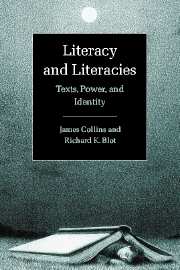Book contents
- Frontmatter
- Contents
- List of figures
- Foreword by Brian V. Street
- Preface
- Acknowledgments
- 1 Introduction: texts, power, and identity
- 2 The literacy thesis: vexed questions of rationality, development, and self
- 3 Situated approaches to the literacy debate
- 4 Literacies and power in modern nation states: Euro-American lessons
- 5 Literacies and identity formation: American cases
- 6 Literacy, power, and identity: colonial legacies and indigenous transformations
- 7 Conclusion: literacy lessons – beginnings, ends, and implications
- Notes
- References
- Index
- Studies in the Social and Cultural Foundations of Language
Preface
Published online by Cambridge University Press: 22 September 2009
- Frontmatter
- Contents
- List of figures
- Foreword by Brian V. Street
- Preface
- Acknowledgments
- 1 Introduction: texts, power, and identity
- 2 The literacy thesis: vexed questions of rationality, development, and self
- 3 Situated approaches to the literacy debate
- 4 Literacies and power in modern nation states: Euro-American lessons
- 5 Literacies and identity formation: American cases
- 6 Literacy, power, and identity: colonial legacies and indigenous transformations
- 7 Conclusion: literacy lessons – beginnings, ends, and implications
- Notes
- References
- Index
- Studies in the Social and Cultural Foundations of Language
Summary
There is a useful phrase in Spanish to describe the development of this book, and probably many other significant research and writing projects: Se hace el camino al andar “One makes the road by walking.” The field of literacy studies is large and heterogeneous, and the debates are longstanding and contentious. When we first conceived this book project, our aim was to achieve a synthesis of the main debates – roughly, a contrast between universalizing and decontextualized views of “the” consequences of literacy and situated, particularizing arguments for a plurality of literacy practices. We intended to organize such a synthesis by attending closely to questions of political economy: how the forms and dynamics of social development identified by Marxian analyses of power, inequality, and subjectivity were implicated in the forms, practices, and evaluations of literacy. In drafting our initial chapters, however, we discovered the value of arguments made by post-structuralists and practice theorists for moving beyond the usual “universalist” versus “relativist” terms of the literacy debate. In particular, we learned from such sources to appreciate the historical depth and conceptual ubiquity of dichotomies such as “oral” and “literate.” What follows is, therefore, less a “grand synthesis” than a series of synthesizing moves, in which we explore debates and materials concerning the issues of text, power, and identity via historical and case-oriented arguments and analyses. We think we provide a synthesis, though certainly not the synthesis of this diverse and fast-changing field.
- Type
- Chapter
- Information
- Literacy and LiteraciesTexts, Power, and Identity, pp. xvii - xviiiPublisher: Cambridge University PressPrint publication year: 2003

